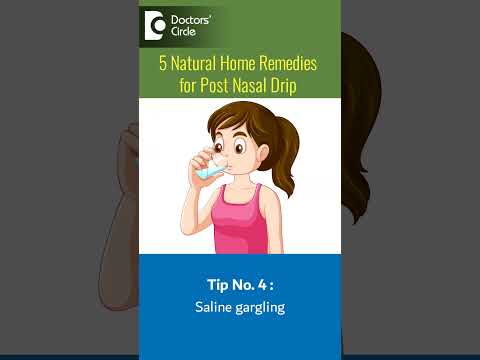If you’ve ever battled with a stubborn cough that feels like it’s coming straight from your throat, you might be dealing with a post nasal drip cough. This annoying condition occurs when excess mucus accumulates in the throat or nasal passages; it can lead to excessive irritation and nagging coughs that just won’t quit. It can arise from various sources like allergies, sinus infections, or even colds. Symptoms can vary from a constant urge to cough to the sensation that you’ve got something stuck in your throat. For many, that includes difficulty sleeping due to relentless nighttime coughing, making you feel drained and cranky!

7 Effective Solutions to Stop Post Nasal Drip Immediately
Don’t let a post nasal drip cough hold you back! Here are seven effective solutions you can use to tackle the problem head-on:
This technique washes away excess mucus and allergens. Products like the Neti Pot or NeilMed Sinus Rinse have been game-changers for many. Just mix saline solution with warm water, and you’re good to go!
Grab medications like pseudoephedrine found in Sudafed to knock down nasal congestion and reduce mucus production. Always consult a healthcare pro to ensure these are safe for you.
If allergies are your problem, reach for antihistamines like loratadine (Claritin) or cetirizine (Zyrtec). Combining these with an air purifier can provide substantial relief.
Moist air can soothe throat irritation. A cool mist humidifier or enjoying steam from a hot shower can loosen that troublesome mucus. You’ll breathe easier and feel better!
Drink up! Staying hydrated helps thin mucus, making it easier to get rid of. Herbal teas like peppermint or ginger not only hydrate but soothe throat discomfort too.
Sleep smarter! Elevate your head with extra pillows to stop mucus from pooling, which can minimize those pesky nighttime coughs.
If persistent symptoms are crashing your party, consider seeing an ENT specialist. Prescription options like corticosteroids can reduce inflammation or specifically target chronic sinus infections.

Recognizing the Symptoms of Post Nasal Drip Cough
Spotting the symptoms of a post nasal drip cough is key to getting relief. It’s not just about coughing! Here are some tell-tale signs:

Seeking Professional Help for Persistent Symptoms
Sometimes, you need to take action that goes beyond the usual remedies. If your post nasal drip cough lasts longer than 10 days without relief, or if you experience fever, severe headaches, or visual disturbances, it’s time to see a professional. These symptoms could indicate a sinus infection or other serious respiratory issues.

Unique Cases: Real-Life Experiences with Post Nasal Drip
Individual experiences highlight how post nasal drip cough affects folks differently. One standout case from a 2023 study by the American Academy of Otolaryngology featured a 30-year-old woman with chronic post nasal drip traced to allergic rhinitis. With a mix of antihistamines and saline rinses, she saw a 70% improvement in her symptoms—her coughing significantly reduced, allowing her to kick her daily grind back into gear.
On the flip side, a 45-year-old man, without known allergies, dealt with post nasal drips from chronic sinus infections. He required more aggressive treatment with corticosteroid nasal sprays and antibiotics. This variety underlines the importance of finding the right medical care tailored to your unique situation.

The Link Between Post Nasal Drip and Blood Pressure: Debunking Myths
You might wonder if there’s a connection between nasal symptoms like post nasal drip and blood pressure—what some call “presion arterial normal.” Stress from discomfort can temporarily raise your blood pressure but don’t confuse it with sustained hypertension. Living a healthy lifestyle, managing stress, and hydrating effectively are practices that contribute to your overall health and help keep your blood pressure in check.
Empowering Your Health Journey
Don’t let a post nasal drip cough hold you back. With the right solutions and knowledge about underlying causes, you can tackle those annoying coughs effectively. Take charge by exploring personal strategies, staying informed, and knowing when to reach out for professional help. By being proactive, you steer your health journey with confidence and clarity, minimizing the impact of post nasal drip cough on your daily routine. Staying fit and strong is an ongoing grind, but from allergies to workouts, don’t forget: you’ve got the power to conquer anything—so go get shredded!
Make sure to check out other engaging content, such as the Superman Vs Batman cast to realize the value of teamwork, or transforming your skills like learning about the hair follicle drug test can help even further in finding health solutions! And don’t forget how crucial staying optimistic is—just like the energy radiated in Eyes Without a Face is needed to keep us progressing through life.
Remember, you’re not in this alone; stay informed, stay strong, and transform your health journey today!
Post Nasal Drip Cough: Fun Trivia and Interesting Facts
Did You Know?
Here’s a fun fact: post nasal drip cough can affect people of all shapes and sizes. Speaking of sizes, did you know that 127 lbs is equivalent to about 57.15 kg? Just like understanding weight conversions can help those into fitness, recognizing the symptoms of post nasal drip is crucial for managing your health. It often occurs when excess mucus accumulates in the back of your throat, leading to the annoying cough that seems to come out of nowhere.
The Connection to Other Conditions
Interestingly, a post nasal drip cough can sometimes mimic symptoms of other ailments. For instance, the sensations may feel similar to those experienced in an anxiety-related Euthymic mood. It’s essential to differentiate between these to find proper treatment. You don’t want to mistake seasonal allergies for something more serious, like a cold—like the kind that might have you combing through a review of a new film, such as “Knock at the Cabin,” trying to get your mind off the cough.
A Cultural Perspective
Moreover, post nasal drip cough isn’t just a health issue; it can often tie into social contexts. For example, think about how you’d feel discussing online concerns about health while you’re feeling symptoms; you might find yourself wrapping up in a metaphorical cancer ribbon as you navigate those conversations. The emotional weight of discomfort can affect interactions, ensuring that people are aware of their health before diving into social outings or exploring hobbies, like filmmaking focused on artists such as Kris Murrell or visionary directors like Gus Van sant.
Each cough may signal a different underlying issue, so understanding your body is key. So next time you’re struggling with a post nasal drip cough, remember the interesting connections that can arise from such a common symptom!



























